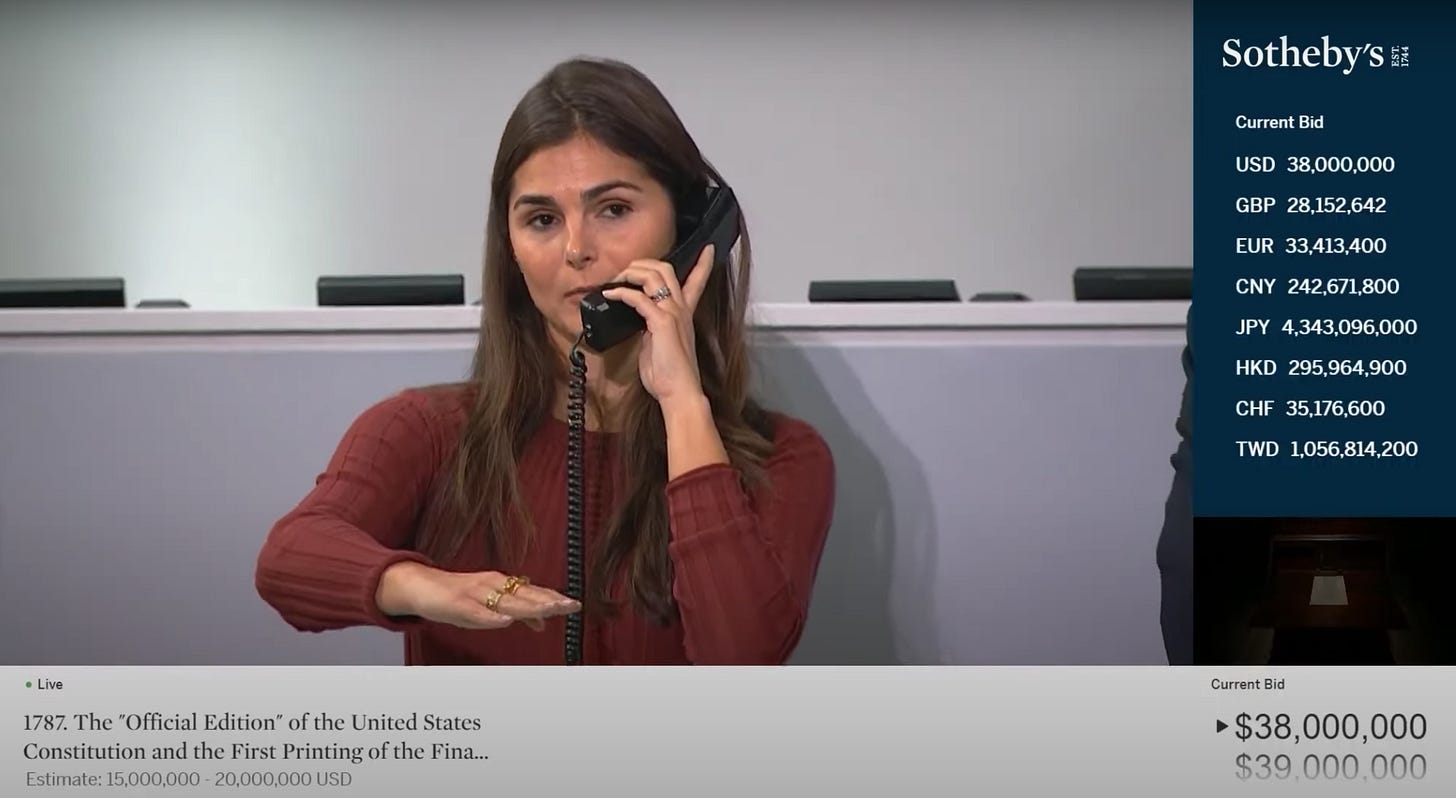Hello friends,
As we hunker down for another pandemic winter, we’re closing out 2021—and the second season of this podcast—with an episode that feels like the perfect opportunity to reflect back on the year’s crypto-infused zeitgeist.
Back in September, Sotheby’s announced it was auctioning off one of 13 surviving original copies of the U.S. constitution. Given the rarity and historic significance of the document, it wasn’t surprising that it would make some headlines. But the news was quickly overshadowed by the revelation that 17,000 people on the internet were teaming up to bid on it. They did this through forming something called a DAO, or Decentralized Autonomous Organization—basically, a kind of non-hierarchical, self-governing community that uses blockchain technology to fundraise, coordinate, and make decisions.
The operation, which came together in just a few weeks, was not particularly well thought out. Given the document’s racist legacy, a lot of people understandably found it pretty offensive that the group had chosen to rally around the Constitution at all. The energy costs associated with the crowdfund (and eventual refund) were enormous, with many small-dollar donors seeing their entire contribution wiped out by Ethereum gas fees—and there were a few too many references to the Nicholas Cage movie National Treasure for our comfort. After collectively raising more than 40 million dollars, ConstitutionDAO almost succeeded in its goal, though they lost out to a hedge fund owner and Republican donor named Ken Griffin.
Even with all the project’s baggage, it was pretty exciting to watch the auction itself go down. For one thing, there was the GameStop-era thrill of seeing a wave of pseudonymous avatars descend on the Sotheby’s live chat with exhortations of “GM.” It was though these people were staking a claim for blockchain-enabled community organizing as a tool that could be used to build a world with new rules, by purchasing the rules of the old one—or at least, that’s how friends-of-the-pod Drew Millard and Kevin Munger, who you may remember from last season, described it in a recent essay called “Imperfect Union: How ConstitutionDAO Lost Its Way.”
Writing for Friends with Benefits—another decentralized autonomous organization that happens to count Emilie as a member of its editorial team—Drew and Kevin set out to examine how ConstitutionDAO happened, where it went wrong, and why, despite bringing so many people together and raising such a jaw-dropping amount of money, it was never really able to transcend its status as a meme. We brought them back on the show to discuss why the whole saga feels so emblematic of the post-Biden zeitgeist and some of the hard lessons we learned this year about financial flash mobs and networked protest movements. We also talk about whether it feels accurate to describe the NFT and meme-stonk delirium of current moment, as some pundits have done, as the new “Roaring Twenties.”
We hope you enjoy the show, and we appreciate you tagging along with us this year. We’ve got some exciting stuff in store for 2022, so stay close. In the meantime, we’re super curious to know if there’s anything you might be interested in hearing us tackle in the future. Just leave us a comment below, or reply to this email. Onwards!
Yours,
Emilie and Andrea
Drew Millard is a freelance writer whose work has appeared in Gawker, The Nation, and The New York Times Magazine. He is currently working on a book about golf, due out in Spring 2021 on Abrams press.
Read more by Drew
“Welcome to the new roaring twenties”
“Please, help me justify my millennial nostalgia”
“Travis Barker is a musical cockroach”
Follow Drew on Twitter
Kevin Munger is an assistant professor of political science and social data analytics at Penn State University and a founding co-editor of the Journal of Quantitative Description: Digital Media. His book, Generation Gap: Why Baby Boomers Still Dominate American Politics and Culture, is available for pre-order here.
Read more by Kevin
“The rise and fall of the Palo Alto consensus”
Follow Kevin on Twitter
















Share this post